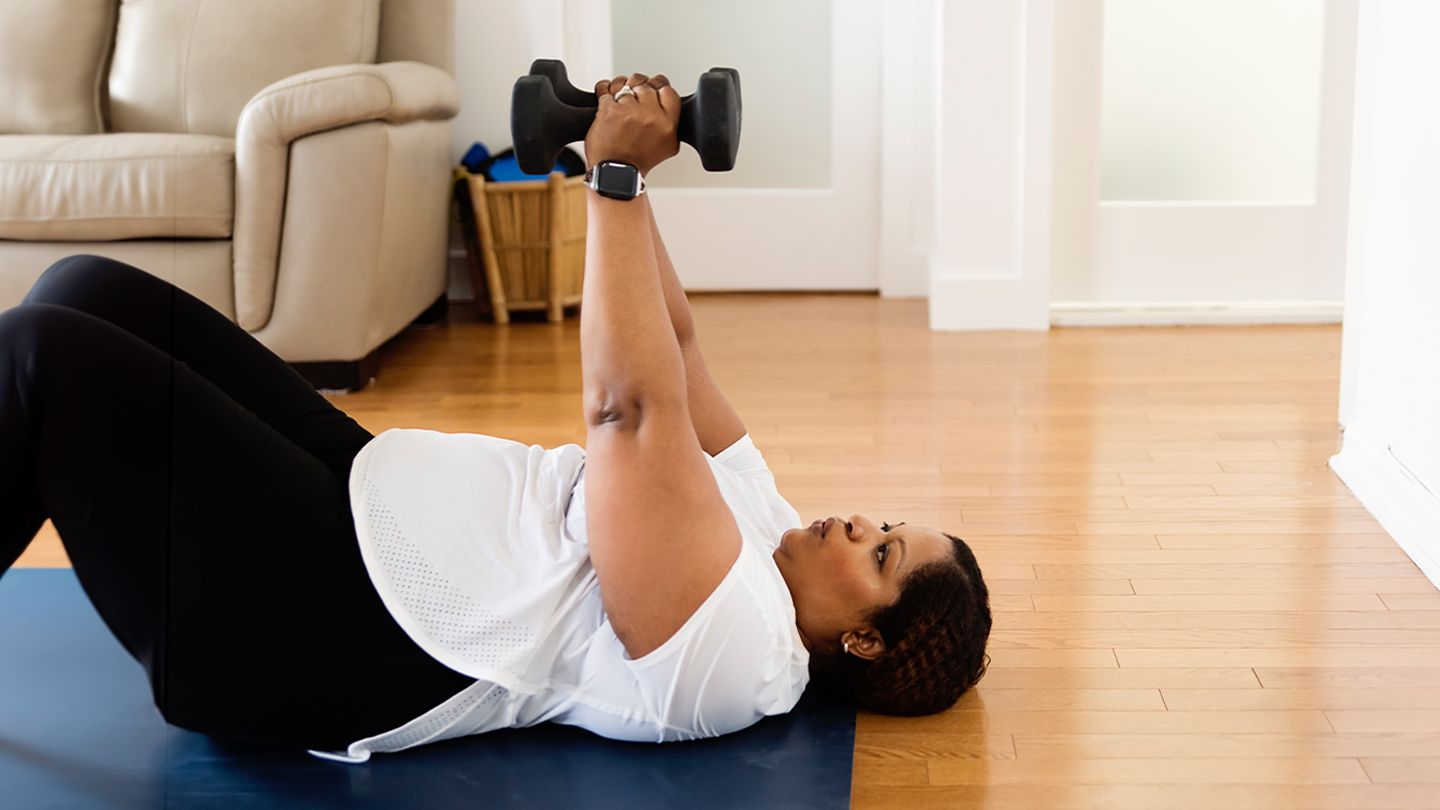For the past few months, I’ve been a bit of a hot mess: anxious, sleep-deprived, and moody. I’ve also been gaining weight around my waistline, which, despite my best efforts, won’t budge even with calorie-counting and exercise. Like most women in their 40s, I suspect I’m entering the throes of perimenopause — the phase of life right before menopause where estrogen levels start to drop. However, when I reached out to my doctor for help, all she told me was to move more and eat less or consider weight loss drugs.
So I went searching for answers. Do women have to admit defeat after their 40th birthday and accept weight gain during perimenopause? Or is there a way to manage perimenopausal symptoms caused by inevitable hormonal shifts?
Research has found that our hormones do play a role. (1) “Weight gain is very common due to the fluctuations, and ultimately the decline, of hormones like estrogen, progesterone, and testosterone,” says Antonietta Vicario, an integrative health coach and chief training officer at Pvolve, a resistance-based exercise program. The decrease of these hormones slows down our metabolism.
According to a recent study, 39 percent of women entering the menopause transition have obese or overweight BMIs. (2) Researchers concluded that these women are also more at risk of developing illnesses like cancer, osteoporosis, sleep apnea, and sexual dysfunction. Therefore, managing perimenopausal weight gain is essential for long-term health and wellness.
So how do we recognize perimenopause and shed the extra pounds that show up at this stage of life? The experts below share their favorite tips and tricks and reveal how to prevent the weight gain from happening in the first place.
What Is Perimenopause?
According to the North American Menopause Society, perimenopause marks “the gradual transition between the reproductive years and menopause.” (3) In other words, it’s the warm-up act for menopause, or the end of a woman’s reproductive cycle, which is defined as having no periods for 12 consecutive months.
Although there are no conclusive diagnostic tests to determine perimenopause, experts agree that it’s easily recognizable by its symptoms. These can include everything from brain fog to anxiety, insomnia, depression, weight gain, and more.
“There are 34 possible symptoms,” says Jacqueline Giannelli, a founding nurse practitioner at Elektra Health, a virtual clinic specializing in menopause. “Classic symptoms include hot flashes and night sweats, but there’s also joint pain, brittle nails, vaginal dryness, irregular periods, and hair loss.”
What Causes Perimenopausal Weight Gain?
The causes of perimenopausal weight gain are complicated, according to the experts.
“It’s not just one thing,” says Giannelli. “We previously thought it was declining estrogen levels that were the main culprit. However, new research is showing that it’s actually fluctuations in your follicle-stimulating hormone, which is essentially the thermostat for the brain. This hormone signals the body to hold onto weight or take it off. We also know there are metabolic reasons like changes in gut health and gut flora [the microorganisms in your intestines]. And we know that we lose muscle mass after age 40 (4), which helps regulate insulin levels.”
Other perimenopausal symptoms can also have an indirect impact on weight. For example, if you aren’t sleeping well, it’s unlikely you’ll have enough energy to work out in the morning. Likewise, anxiety or depression can make us want to crawl under the covers or binge on ice cream or wine.
“We know stress levels greatly impact weight,” says Giannelli. “Cortisol directly impacts how we sleep, and when we sleep well, we make better choices, like to eat better and exercise. Hunger hormones like leptin and ghrelin are disrupted directly as a result of poor sleep.”
How Do I Lose Perimenopausal Weight?
Losing weight during perimenopause may be harder than it was when you were younger, but it’s definitely not impossible.
“Integrating exercise and movement into your daily routine can make a big difference, but it’s also the type of exercise you do that really has a big impact during perimenopause,” says Vicario. “Many people think they must endure long spurts of cardio to lose weight, but weight training is actually the single most important thing a woman can do to offset weight gain. Since muscle keeps our metabolism optimized, we really need to train two to three times a week to help offset changes in our weight.”
This can be confusing for women like me, who have been told by their doctors to move more and eat less. After all, we grew up in an era where step aerobics and Tae Bo were touted as the end-all, be-all. Cardio was king. So, how is it possible that everything we thought we knew about weight loss is wrong?
“Cardio gets a bit tricky during menopause,” explains Vicario. ”We want to make sure not to spike our stress hormones, particularly cortisol, which can slow down all of our body’s functions, including our metabolism.” One study found that cardio can lead to a greater production of cortisol compared to resistance training. (5)
Why Is It Important to Avoid Perimenopausal Weight Gain?
Gaining too much weight can eventually lead to illness as we age. A study from the Centers for Disease Control and Prevention reported that people who are categorized with an overweight or obese BMI are at a higher risk of developing high blood pressure, type 2 diabetes, and stroke, among other problems. (6)
“There’s a mindset shift that needs to happen,” says Giannelli. “Weight gain in and of itself isn’t necessarily the problem. It’s the change in our body composition and where the weight is going that is concerning. When weight goes to our midsection, the presence of visceral fat around our internal organs causes more fat to be deposited. You get into this vicious cycle, which eventually causes insulin sensitivity. That insulin resistance is what we want to try to prevent from happening in the first place because it can lead to diabetes and heart disease.”
The Bottom Line
Losing weight in your 40s and 50s is a lot harder than it was in your 20s and 30s, but it’s definitely possible. You just need to adjust your expectations and adapt to accommodate your fluctuating hormones.
“Stop looking at the number on the scale and come from a place of self-compassion,” says Vicario. “Change your focus from being skinny to being healthy and strong … be patient and give yourself grace. We all want to live well into our 70s and 80s and beyond. This second phase of your life is an opportunity as much as it is a challenge.”
Editorial Sources and Fact-Checking
- Lizcano F, Guzmán G. Estrogen Deficiency and the Origin of Obesity During Menopause. BioMed Research International. March 6, 2014.
- Sakshi C, Sharma KA, Ranjan P, et al. Weight Management Module for Perimenopausal Women: A Practical Guide for Gynecologists. Journal of Mid-Life Health. October–December 2019.
- Perimenopause and Premature Menopause FAQ. The North American Menopause Society.
- Keller K, Englehardt M. Strength and Muscle Mass Loss with Aging Process. Age and Strength Loss. Muscle, Ligaments and Tendons Journal. October–December 2013.
- Torres R, Koutakis P, Forsse J. The Effects of Different Exercise Intensities and Modalities on Cortisol Production in Healthy Individuals: A Review. Journal of Exercise and Nutrition. October 28, 2021.
- Health Effects of Overweight and Obesity. Centers for Disease Control and Prevention. September 24, 2022.

